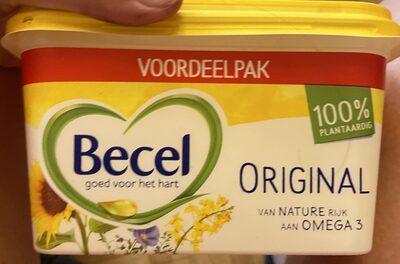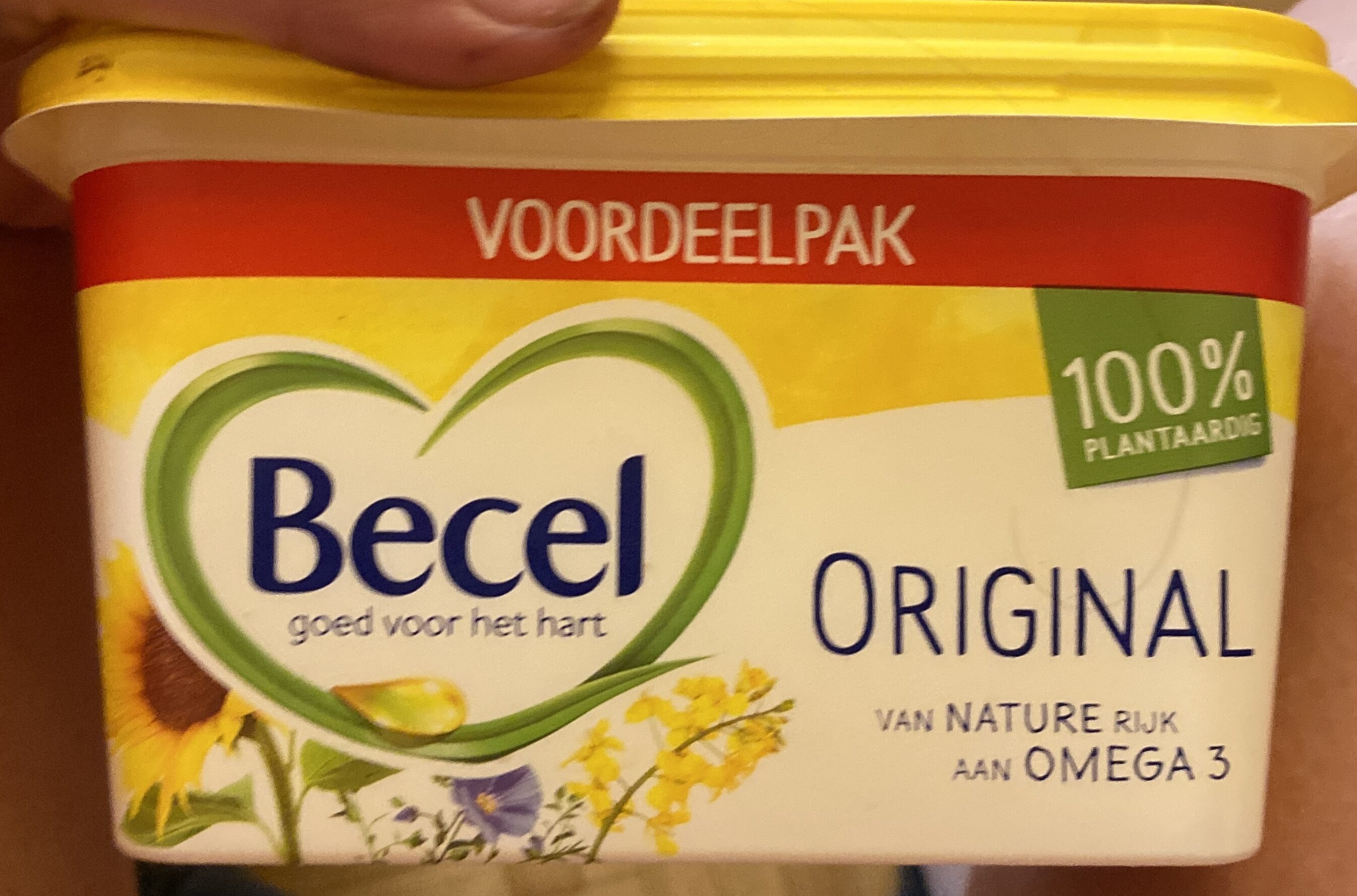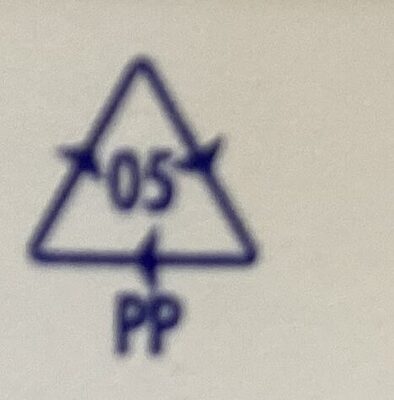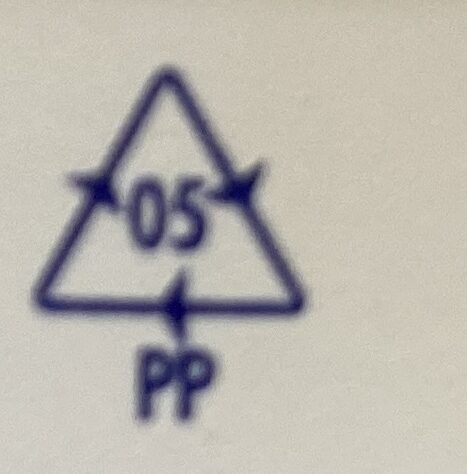Help us make food transparency the norm!
As a non-profit organization, we depend on your donations to continue informing consumers around the world about what they eat.
The food revolution starts with you!
Original - Becel - 575 g
Original - Becel - 575 g
This product page is not complete. You can help to complete it by editing it and adding more data from the photos we have, or by taking more photos using the app for Android or iPhone/iPad. Thank you!
×
Barcode: 8719200112254 (EAN / EAN-13)
Quantity: 575 g
Packaging: Plastic
Brands: Becel
Categories: Plant-based foods and beverages, Plant-based foods, Fats, Spreads, Plant-based spreads, Spreadable fats, Vegetable fats, Animal fats, Margarines, Butter fat
Labels, certifications, awards: 100% vegetable
Countries where sold: Netherlands
Matching with your preferences
Health
Ingredients
-
18 ingredients
Dutch: Water, plantaardige oliën (zonnebloem 26%, lijnzaad 11%, palm 6%, koolzaad 2%), emulgatoren (mono-en diglyceriden van vetzuren, lecithine), natuurlijk aroma, vitamine (A, B1, B2, B6, B12, D, foliumzuur).
Food processing
-
Ultra processed foods
Elements that indicate the product is in the 4 - Ultra processed food and drink products group:
- Additive: E101 - Riboflavin
- Additive: E322 - Lecithins
- Additive: E471 - Mono- and diglycerides of fatty acids
- Ingredient: Emulsifier
- Ingredient: Flavouring
Food products are classified into 4 groups according to their degree of processing:
- Unprocessed or minimally processed foods
- Processed culinary ingredients
- Processed foods
- Ultra processed foods
The determination of the group is based on the category of the product and on the ingredients it contains.
Additives
-
E101 - Riboflavin
Riboflavin: Riboflavin, also known as vitamin B2, is a vitamin found in food and used as a dietary supplement. Food sources include eggs, green vegetables, milk and other dairy product, meat, mushrooms, and almonds. Some countries require its addition to grains. As a supplement it is used to prevent and treat riboflavin deficiency and prevent migraines. It may be given by mouth or injection.It is nearly always well tolerated. Normal doses are safe during pregnancy. Riboflavin is in the vitamin B group. It is required by the body for cellular respiration.Riboflavin was discovered in 1920, isolated in 1933, and first made in 1935. It is on the World Health Organization's List of Essential Medicines, the most effective and safe medicines needed in a health system. Riboflavin is available as a generic medication and over the counter. In the United States a month of supplements costs less than 25 USD.Source: Wikipedia
-
E322 - Lecithins
Lecithins are natural compounds commonly used in the food industry as emulsifiers and stabilizers.
Extracted from sources like soybeans and eggs, lecithins consist of phospholipids that enhance the mixing of oil and water, ensuring smooth textures in various products like chocolates, dressings, and baked goods.
They do not present any known health risks.
-
E322i - Lecithin
Lecithins are natural compounds commonly used in the food industry as emulsifiers and stabilizers.
Extracted from sources like soybeans and eggs, lecithins consist of phospholipids that enhance the mixing of oil and water, ensuring smooth textures in various products like chocolates, dressings, and baked goods.
They do not present any known health risks.
-
E471 - Mono- and diglycerides of fatty acids
Mono- and diglycerides of fatty acids (E471), are food additives commonly used as emulsifiers in various processed foods.
These compounds consist of glycerol molecules linked to one or two fatty acid chains, which help stabilize and blend water and oil-based ingredients. E471 enhances the texture and shelf life of products like margarine, baked goods, and ice cream, ensuring a smooth and consistent texture.
It is generally considered safe for consumption within established regulatory limits.
Ingredients analysis
-
Palm oil
Ingredients that contain palm oil: Palm
-
Vegan status unknown
Unrecognized ingredients: Thiamin, Vitamin b12, Vitamin D, Folic acid
-
Vegetarian status unknown
Unrecognized ingredients: Thiamin, Vitamin b12, Vitamin D, Folic acid
-
Details of the analysis of the ingredients
nl: Water, plantaardige oliën (zonnebloem 26%, lijnzaad 11%, palm 6%, koolzaad 2%), emulgatoren (mono- en diglyceriden van vetzuren, lecithine), natuurlijk aroma, vitaminen, vitamine A, vitamine B1, vitamine B2, vitamine B6, vitamine B12, vitamine D, foliumzuur- Water -> en:water - vegan: yes - vegetarian: yes - ciqual_food_code: 18066 - percent_min: 45 - percent_max: 55
- plantaardige oliën -> en:vegetable-oil - vegan: yes - vegetarian: yes - from_palm_oil: maybe - percent_min: 45 - percent_max: 45
- zonnebloem -> en:sunflower - vegan: yes - vegetarian: yes - percent_min: 26 - percent: 26 - percent_max: 26
- lijnzaad -> en:flax-seed - vegan: yes - vegetarian: yes - ciqual_food_code: 15034 - percent_min: 11 - percent: 11 - percent_max: 11
- palm -> en:palm - vegan: yes - vegetarian: yes - from_palm_oil: yes - ciqual_food_code: 16129 - percent_min: 6 - percent: 6 - percent_max: 6
- koolzaad -> en:rapeseed - vegan: yes - vegetarian: yes - percent_min: 2 - percent: 2 - percent_max: 2
- emulgatoren -> en:emulsifier - percent_min: 0 - percent_max: 10
- mono- en diglyceriden van vetzuren -> en:e471 - vegan: maybe - vegetarian: maybe - from_palm_oil: maybe - percent_min: 0 - percent_max: 10
- lecithine -> en:e322i - vegan: maybe - vegetarian: maybe - percent_min: 0 - percent_max: 5
- natuurlijk aroma -> en:natural-flavouring - vegan: maybe - vegetarian: maybe - percent_min: 0 - percent_max: 5
- vitaminen -> en:vitamins - vegan: yes - vegetarian: yes - percent_min: 0 - percent_max: 3.33333333333333
- vitamine A -> en:vitamin-a - vegan: yes - vegetarian: yes - percent_min: 0 - percent_max: 2.5
- vitamine B1 -> en:thiamin - percent_min: 0 - percent_max: 2
- vitamine B2 -> en:e101 - vegan: maybe - vegetarian: yes - percent_min: 0 - percent_max: 1.66666666666667
- vitamine B6 -> en:vitamin-b6 - vegan: yes - vegetarian: yes - percent_min: 0 - percent_max: 1.42857142857143
- vitamine B12 -> en:vitamin-b12 - percent_min: 0 - percent_max: 1.25
- vitamine D -> en:vitamin-d - percent_min: 0 - percent_max: 1.11111111111111
- foliumzuur -> en:folic-acid - percent_min: 0 - percent_max: 1
Nutrition
-
Average nutritional quality
⚠ ️Warning: the amount of fruits, vegetables and nuts is not specified on the label, it was estimated from the list of ingredients: 2This product is not considered a beverage for the calculation of the Nutri-Score.
The product is in the fats category, the points for saturated fat are replaced by the points for the saturated fat / fat ratio.
Positive points: 0
- Proteins: 0 / 5 (value: 0.5, rounded value: 0.5)
- Fiber: 0 / 5 (value: 0, rounded value: 0)
- Fruits, vegetables, nuts, and colza/walnut/olive oils: 0 / 5 (value: 2, rounded value: 2)
Negative points: 6
- Energy: 4 / 10 (value: 1664, rounded value: 1664)
- Sugars: 0 / 10 (value: 0.5, rounded value: 0.5)
- Saturated fat / fat ratio: 2 / 10 (value: 20.2222222222222, rounded value: 20.2)
- Sodium: 0 / 10 (value: 4, rounded value: 4)
The points for proteins are counted because the negative points are less than 11.
Nutritional score: (6 - 0)
Nutri-Score:
-
Nutrient levels
-
Fat in high quantity (45%)
What you need to know- A high consumption of fat, especially saturated fats, can raise cholesterol, which increases the risk of heart diseases.
Recommendation: Limit the consumption of fat and saturated fat- Choose products with lower fat and saturated fat content.
-
Saturated fat in high quantity (9.1%)
What you need to know- A high consumption of fat, especially saturated fats, can raise cholesterol, which increases the risk of heart diseases.
Recommendation: Limit the consumption of fat and saturated fat- Choose products with lower fat and saturated fat content.
-
Sugars in low quantity (0.5%)
What you need to know- A high consumption of sugar can cause weight gain and tooth decay. It also augments the risk of type 2 diabetes and cardio-vascular diseases.
Recommendation: Limit the consumption of sugar and sugary drinks- Sugary drinks (such as sodas, fruit beverages, and fruit juices and nectars) should be limited as much as possible (no more than 1 glass a day).
- Choose products with lower sugar content and reduce the consumption of products with added sugars.
-
Salt in low quantity (0.01%)
What you need to know- A high consumption of salt (or sodium) can cause raised blood pressure, which can increase the risk of heart disease and stroke.
- Many people who have high blood pressure do not know it, as there are often no symptoms.
- Most people consume too much salt (on average 9 to 12 grams per day), around twice the recommended maximum level of intake.
Recommendation: Limit the consumption of salt and salted food- Reduce the quantity of salt used when cooking, and don't salt again at the table.
- Limit the consumption of salty snacks and choose products with lower salt content.
-
-
Nutrition facts
Nutrition facts As sold
for 100 g / 100 mlCompared to: Butter fat Energy 1,664 kj
(398 kcal)-49% Fat 45 g -49% Saturated fat 9.1 g -83% Monounsaturated fat 11 g -46% Polyunsaturated fat 25 g +286% Omega 3 fat 5,900 mg Omega 6 fat 19,000 mg Carbohydrates 0.5 g +36% Sugars 0.5 g +136% Fiber - Proteins 0.5 g +92% Salt 0.01 g -96% Vitamin A 800 µg +7% Vitamin D 7.5 µg Vitamin E 14 mg -99% Fruits‚ vegetables‚ nuts and rapeseed‚ walnut and olive oils (estimate from ingredients list analysis) 2 %
Environment
-
Eco-Score C - Moderate environmental impact
⚠ ️Select a country in order to include the full impact of transportation.The Eco-Score is an experimental score that summarizes the environmental impacts of food products.→ The Eco-Score was initially developped for France and it is being extended to other European countries. The Eco-Score formula is subject to change as it is regularly improved to make it more precise and better suited to each country.Life cycle analysis
-
Average impact of products of the same category: B (Score: 79/100)
Category: Vegetable fat (margarine type), spreadable, 50-63% fat, light, unsalted, rich in omega 3
Category: Vegetable fat (margarine type), spreadable, 50-63% fat, light, unsalted, rich in omega 3
- PEF environmental score: 0.28 (the lower the score, the lower the impact)
- including impact on climate change: 1.81 kg CO2 eq/kg of product
Stage Impact Agriculture
40.1 %Processing
40.4 %Packaging
5.3 %Transportation
10.0 %Distribution
3.3 %Consumption
0.9 %
Bonuses and maluses
-
Missing origins of ingredients information
Malus: -5
⚠ ️ The origins of the ingredients of this product are not indicated.
If they are indicated on the packaging, you can modify the product sheet and add them.
If you are the manufacturer of this product, you can send us the information with our free platform for producers.
-
Ingredients that threatens species
Malus: -10
Contains palm oil
Tropical forests in Asia, Africa and Latin America are destroyed to create and expand oil palm tree plantations. The deforestation contributes to climate change, and it endangers species such as the orangutan, the pigmy elephant and the Sumatran rhino.
-
Packaging with a medium impact
Malus: -10
Shape Material Recycling Impact Unknown 81 C/PP High ⚠ ️ The information about the packaging of this product is not sufficiently precise (exact shapes and materials of all components of the packaging).⚠ ️ For a more precise calculation of the Eco-Score, you can modify the product page and add them.
If you are the manufacturer of this product, you can send us the information with our free platform for producers.
Eco-Score for this product
-
Impact for this product: C (Score: 54/100)
Product: Original - Becel - 575 g
Life cycle analysis score: 79
Sum of bonuses and maluses: -25
Final score: 54/100
-
Carbon footprint
-
Equal to driving 0.9 km in a petrol car
181 g CO² per 100g of product
The carbon emission figure comes from ADEME's Agribalyse database, for the category: Vegetable fat (margarine type), spreadable, 50-63% fat, light, unsalted, rich in omega 3 (Source: ADEME Agribalyse Database)
Stage Impact Agriculture
27.3 %Processing
42.4 %Packaging
10.0 %Transportation
17.9 %Distribution
2.1 %Consumption
0.4 %
Packaging
-
Packaging with a medium impact
-
Packaging parts
(81 C/PP)
-
Packaging materials
Material % Packaging weight Packaging weight per 100 g of product
-
Transportation
-
Origins of ingredients
Missing origins of ingredients information
⚠ ️ The origins of the ingredients of this product are not indicated.
If they are indicated on the packaging, you can modify the product sheet and add them.
If you are the manufacturer of this product, you can send us the information with our free platform for producers.Add the origins of ingredients for this product Add the origins of ingredients for this product
Threatened species
-
Contains palm oil
Drives deforestation and threatens species such as the orangutan
Tropical forests in Asia, Africa and Latin America are destroyed to create and expand oil palm tree plantations. The deforestation contributes to climate change, and it endangers species such as the orangutan, the pigmy elephant and the Sumatran rhino.
Report a problem
-
Incomplete or incorrect information?
Category, labels, ingredients, allergens, nutritional information, photos etc.
If the information does not match the information on the packaging, please complete or correct it. Open Food Facts is a collaborative database, and every contribution is useful for all.
Data sources
Product added on by openfoodfacts-contributors
Last edit of product page on by bertusdendroef.
Product page also edited by aleene, kiliweb, off.d576a6d9-a0b0-4a37-9403-213478fe6823, pepernoot, yuka.sY2b0xO6T85zoF3NwEKvlnJ6cYSErRfqOhLluhWw_fiWALrHR49Uv42mC6s.












